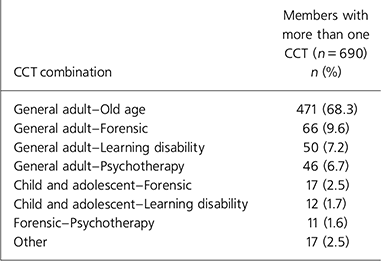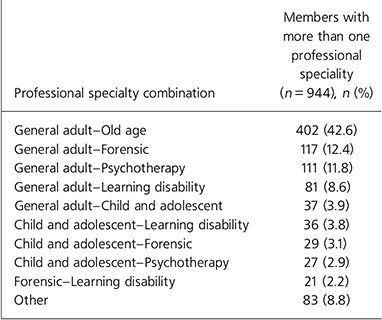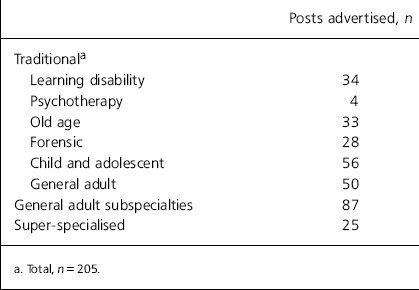Postgraduate training in psychiatry in recent years has to some degree been able to adapt to service needs developments and this led to the creation of specific dual training schemes in forensic psychotherapy in 2000. The psychiatric profession, led by the College, must ensure that dual training, which was once considered a crucial part of higher specialist training, is not sidelined into post-Certificate of Completion of Training (CCT) training. Continuing professional development for consultants must continue to be just that, not post-CCT training to enable doctors to undertake a specialised consultant role. We examine whether there is a continued role for dual training in psychiatry and how this fits into the new structure of postgraduate medical education.
There are currently six CCT specialties within psychiatry, with general adult psychiatry allowing the possibility of three subspecialty endorsements (liaison psychiatry, addiction psychiatry and rehabilitation psychiatry). Dual training in psychiatry is popular among trainees and has been viewed as a way of gaining a broader range of experience and training. A previous survey found that 26% of specialist registrars would be interested in dual training in psychotherapy. Reference Pretorius and Goldbeck1 Historically, general adult and old age psychiatry was a popular combination for dual training. A survey of old age specialist registrars in 2001 found that 67% were registered for dual accreditation and a variety of reasons for opting for dual training were stated including wider training experience, greater flexibility for consultant posts and service needs. Reference Allen and Butler2 In addition, the recent changes in mental health services 3 have highlighted the need for consultant psychiatrists to have different skill combinations for effective service provision and consequently dual training in other speciality combinations (e.g. forensic psychotherapy and forensic child and adolescent psychiatry) have become more popular.
Factors affecting the future of dual training
There are three main factors that affect the future of dual training in psychiatry: Modernising Medical Careers (MMC), the possibility of a single CCT in psychiatry, and competency-based training.
Modernising Medical Careers
The introduction in August 2007 of run-through training via Modernising Medical Careers (MMC) significantly redefines postgraduate training. Under MMC there is an indicative term of 6 years from undertaking specialist training to achieving a CCT. Although it appears that there will continue to be the scope to provide both dual training and subspecialty certification under the MMC framework, 4 this is likely to require a longer period of training and it is unclear how this will be facilitated. Access to dual training will continue to be at the deanery level but it appears that it will be much more linked to service provision.
Single CCT
When we initially started our investigations, there were discussions within the Central Executive Committee of the Royal College of Psychiatrists that there should be one CCT awarded in psychiatry, with accreditation in different specialties of psychiatry. This would require approval by both the British and European parliaments and it would therefore be several years before it would come into effect. It would not only increase the specialties that a psychiatrist could be accredited in (e.g. the current general adult psychiatry endorsements may become fully accredited specialties) but would also empower the College to create more specialties rather than seeking approval from Parliament each time. This would correspondingly increase the combinations available for dual training. However, more recently, the College's Central Executive Committee has decided not to apply for a single CCT in psychiatry at this time. The College is, however, continuing to consider how best to accommodate the increasing specialisation within psychiatry training.
Competency-based training
The College's competency-based psychiatry curriculum approved by the Postgraduate Medical Education and Training Board 5 (PMETB) changes the emphasis from duration of training to achievement of competencies. This may make it easier for doctors to demonstrate achieved competencies across psychiatric specialties.
The current situation
The Royal College of Psychiatrists holds a database of professional details of its members. The CCTs awarded are recorded and each member also provides details of their professional specialty (the area of psychiatry in which they are working).
Of the 10 609 UK members of the College (as of September 2007), 690 have more than one CCT (one member had three CCTs). The majority of doctors with two CCTs held general adult and old age CCTs (471 of 689). Of those who had dual trained in general adult and old age, 226 listed both professional specialties on the College database, 134 listed only old age and 105 listed general adult. The CCT combinations which are held by more than 10 members are shown in Table 1.
Table 1. Certificate of Completion of Training (CCT) combinations of College members

| CCT combination | Members with more than one CCT (n = 690) n (%) |
|---|---|
| General adult–Old age | 471 (68.3) |
| General adult–Forensic | 66 (9.6) |
| General adult–Learning disability | 50 (7.2) |
| General adult–Psychotherapy | 46 (6 7) |
| Child and adolescent–Forensic | 17 (2.5) |
| Child and adolescent–Learning disability | 12 (1.7) |
| Forensic–Psychotherapy | 11 (1.6) |
| Other | 17 (2.5) |
A total of 944 members listed more than one professional specialty. Similarly to CCTs, the most frequent combination of professional specialties was general adult and old age (402 of 944). The professional specialty combinations which are held by more than 20 members are shown in Table 2.
Table 2. Professional speciality combinations of College members

| Professional specialty combination | Members with more than one professional speciality (n = 944), n (%) |
|---|---|
| General adult–Old age | 402 (42.6) |
| General adult–Forensic | 117 (12.4) |
| General adult–Psychotherapy | 111 (11.8) |
| General adult–Learning disability | 81 (8.6) |
| General adult–Child and adolescent | 37 (3.9) |
| Child and adolescent–Learning disability | 36 (3.8) |
| Child and adolescent–Forensic | 29 (3.1) |
| Child and adolescent–Psychotherapy | 27 (2.9) |
| Forensic–Learning disability | 21 (2.2) |
| Other | 83 (8.8) |
Of the 690 doctors with more than one CCT, 360 have their two CCTs matching their professional specialties. An additional 311 doctors have just one of their two CCTs matching one of their professional specialties. Only 18 doctors with more than one CCT have no matches between their CCTs and professional specialties. Less than half of those with both general adult and old age CCTs were using them both in their professional practice. The CCT combinations that were being utilised most in professional practice were:
-
• child and adolescent and psychotherapy (2 utilised of 2 existing);
-
• child and adolescent and forensic (13 of 17);
-
• child and adolescent and learning disability (9 of 12);
-
• forensic and learning disability (6 of 8);
-
• forensic and psychotherapy (8 of 11).
Although the data obtained from the College membership database relies on the accuracy of the information provided directly by members, these figures suggest that that the listed combinations of dual training are those for which there is a direct service need, as the majority of those trained in these areas are utilising their skills in their clinical practice.
Service need
We reviewed the advertisments in the BMJ for consultant psychiatrists (substantive and locum) over a 6-month period from October 2007 to March 2008. The breakdown of these posts is shown in Table 3. The posts were categorised as either traditional specialty services (e.g. a general adult job covering a locality with both in-patient and out-patient work), general adult subspecialties (e.g. community specific services, early intervention, rehabilitation and recovery) or super-specialised (e.g. forensic learning disability).
Table 3. Breakdown of consultant advertisments in the BMJ October 2007 to March 2008

| Posts advertised, n | |
|---|---|
| Traditionala | |
| Learning disability | 34 |
| Psychotherapy | 4 |
| Old age | 33 |
| Forensic | 28 |
| Child and adolescent | 56 |
| General adult | 50 |
| General adult subspecialties | 87 |
| Super-specialised | 25 |
This shows that although the workforce still demands the role of the consultant to work in traditional services (generic mental health service provisions) there are a large proportion of posts in general adult subspecialty services. There are also significant numbers of posts in services that are super-specialised. These include services which overlap the traditional CCT boundaries (e.g. adolescent forensic, forensic learning disability, child and adolescent and learning disability) and for which dual training would be a significant advantage for the consultant delivering the service. At present, training is not coherently linked to this increasing specialisation. Indeed, the subspecialisation of psychiatry (particularly within general adult psychiatry) is having an impact on the delivery of training. This means that trainees, particularly those in the early stages of training, may have difficulty obtaining a broad range of experience if they work with consultants who manage narrowly defined groups of patients. In contrast, the subspecialisation of services may be advantageous for more senior trainees who wish to gain experience of these more specialised services.
The way forward
The above review of advertisements for consultant posts indicates that there are clear service needs for psychiatrists with skills and experience that bridge the traditional subspecialty divide. Examples include the unmet need that has been demonstrated in the mental health of children with intellectual disabilities. Reference Allington-Smith6 Such posts are likely to increase in the future as medicine as a whole becomes more super-specialised. Analysis of the College database shows that the majority of those with dual CCTs in forensic psychotherapy, forensic child and adolescent psychiatry, learning disability and child and adolescent psychiatry, learning disability and forensic psychiatry, and child and adolescent psychiatry and psychotherapy are utilising all of the competencies gained via dual training for patient care. There is therefore a need to consider how dual training in these specialties can be preserved to ensure the best care for our patients.
At present it is unclear to what extent dual training opportunities will exist within the new structure of MMC. Indeed, we are aware of very few dual training opportunities being offered at ST4 level at present. With MMC training to CCT producing ‘specialists’ rather than ‘consultants’ there is a need for the profession to strive for a consultant-led service that is led by specialists with competencies that meet the needs of patients and carers. Doctors must be appropriately trained to meet the changing needs of their patients. It is crucial that there is scope in the new training system for doctors to obtain a range of competencies that may be required for specialist services and teams.
It has been suggested that training in a second psychiatric specialty may occur after the first CCT has been achieved. It seems that any post-CCT training would only occur if a definable service need for a consultant with expertise in both specialties is identified. This raises a number of issues, most crucially surrounding the funding of this additional post-CCT training. Deaneries would have fulfilled their responsibility to provide training to CCT and may be reluctant to fund training beyond this. It could be argued that trusts should finance such training as they would benefit from the ability to provide greater services. However, unless a new service was being developed, it is difficult to envisage the effective workforce planning needed to decide to offer a doctor 2 years additional training with a guarantee that there was a gap in service provision for a consultant at the end of that time period. Would the trainee themselves be forced to take up a service job while trying to obtain competencies in the specialty they required to work in the area of their choice?
The special interest and research days in higher training have recently been reduced to one professional development day. This may result in less time for trainees to gain clinical special interests as a result of the requirement of demonstrating competencies in teaching, management and research. However, special interest sessions could be used to obtain competencies in a specialty other than that in which the trainee will obtain their CCT. For example, a child and adolescent trainee may obtain experience in substance misuse (an example taken from the consultant jobs recently advertised). This would require careful planning and cooperation between trusts and training programme directors. This example represents a new area of diverse clinical expertise that was not previously covered by dual training. Although special interest sessions go some way towards allowing trainees to gain wider clinical expertise, they are not sufficient to provide appropriate time and experience in subspecialties such as forensic psychotherapy or adolescent forensic psychiatry.
Further into the future, the creation of one CCT would dramatically change the concept of dual training. However, the service need for the variety of skills will remain. It is likely that the number of accredited specialties in psychiatry will increase. It may be that the range of competencies obtained would demonstrate the doctor's expertise in those accredited fields rather than the award of dual CCTs. This would still require a longer period of training compared with traditional single CCT specialty schemes and therefore suitable provisions would need to be made. The College's Education, Training and Standards Committee has recently endorsed the principle of continuing dual training for specialty combinations for which there is a clear patient need. However, it will be the Deaneries who are tasked with delivering this vision, the implementation of which is currently far from certain.
Continuing professional development should enable doctors to develop new interests and areas of expertise across the lifespan of their careers. Post-CCT training may be a mechanism for consultants to gain additional competencies across specialties for working in niche super-specialised areas. Any such provision needs to be structured to protect the value of the CCT and should have the quality assurance processes of pre-CCT training posts. Post-CCT training should not dilute the increasing importance of continuing professional development within the consultant grade.
Conclusion
It is clear that there are specialty combinations that remain crucial to service provision and appropriate training must therefore exist to ensure that there are specialists in these areas. However, traditional dual training appears to be under threat and adaptations need to be made to the new structure of postgraduate training to allow trainees to develop the necessary competencies across specialties. The rhetoric surrounding MMC promised greater flexibility of training and it is of paramount importance that this is developed in order for trainees to achieve the broad and diverse range of competencies that are required by these developing services. This will allow us to meet the needs of our patients and deliver the best possible care.
Declaration of interest
C.O. is the Chair and O.W. is the immediate past Chair of the Psychiatric Trainees' Committee of the Royal College of Psychiatrists. O.W. is a Specialist Registrar undertaking dual training in Child and Adolescent and Forensic Psychiatry. S.B. is the Registrar of the Royal College of Psychiatrists and a Professor of Child and Adolescent Forensic Mental Health.
Acknowledgements
We thank Paul O’Connor for collating the information from the College membership database.






eLetters
No eLetters have been published for this article.